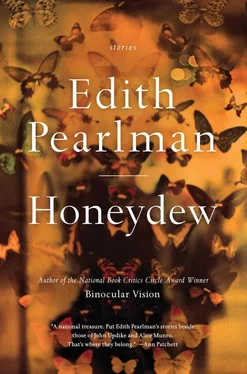Daphna was now often seen at the supermarket, accompanied by the youngest daughter, who examined each item and calculated its price per ounce and chose the cheapest, and at the same time kept a running total in her head — I knew she did that; Connie’s remarkable intuition saw tumblers spinning behind the girl’s forehead. Daphna began to cook almost every night — I knew that too; Lucienne provided her with many of the recipes. Sam and the family could probably fit themselves around the kitchen table, especially if the debris were removed. But Sabbath dinner had always been served in the dining room, heavy with the dark furniture that came with the dark house. On Fridays, driving by, slowing up, I could see six people around the table, could see Sam’s curls brazen in the candlelight.
Wednesdays became safe. Every day was safe. Daphna had retreated into her expanded family. I wished them all good listening.
III.
It was on a Wednesday that the package came — Wednesday morning, a few days after New Year’s Eve. The postman held it out to me at arm’s length. The package was oblong and bore Israeli stamps and was addressed to Daphna in English. “Nobody’s home there, not even Flanagan.” (Postmen know everything.) “Would you sign for it?” As a proper Godolphin citizen, I complied.
I forgot about it for a day. But on Thursday when I got home from the Marigold Café I noticed it on my Stephen Badlam chest, the one item of furniture I’d salvaged from Daddy’s house. I picked it up and hurried down the street, still wearing my otter coat, twelve years old now but once stunning, still wearing my high-heeled boots. The evening was misty, and warm enough for me to unbutton the coat as I walked. Rand had proposed that afternoon. I was thinking it over. I liked sailing with him off Wings Neck. I’d like being moneyed again. I could sell the business. And though I would never forget Patrick, I could buy another horse…
I walked up the seven moist steps. No one answered my ring. I walked down and made my way along the driveway, past the red Vespa. I rang the back doorbell.
Who opened it? The youngest girl, I think, scrambling up from the floor where she and the middle one were sitting, each with a bowl of stew — one of Lucienne’s recipes, probably. One girl was eating with a spoon, the other was not. The stew proper was in a large enameled pan on the stove, and its fragrance almost banished the odor of cranberries burning in another pot. Other things cooked on other burners. Something sweet baked unseen in the oven. The fan, never fixed, did not dissipate these aromas. The room was steamy and it was illuminated only here and there, like a Rembrandt tavern. Some light came from a tipsy lamp on the table; some from a butterscotch disk, circa 1930, embedded in the ceiling; some from a bulb on a pole with a shredding shade; some from a weak fluorescent bar imperfectly attached to the stove. Daphna was standing at the stove, stirring and tasting, then raising her wooden spoon like a scepter. She and the girls wore golden hoops in their ears — the daughters had apparently prevailed in the matter of lobes. Their long hair was loose and lustrous. The oldest was sitting on a high stool, reading. Avner and Sam, at the table, argued in a peaceable way, each gesturing with a wineglass. The table was littered as usual, but a few plates had been laid.
I approached Daphna. “This is yours.” Garlic and rosemary threatened to overwhelm me. The two men belatedly stood up. Sam overturned his wineglass. I handed the package to Daphna.
“From Abba!” she cried. She tore away the stiff mailing paper and unwrapped corrugated cardboard from three books. I saw that one was French and another German. The cover of the third was embossed with beautiful, curly letters. She pressed all three to her breast. I motioned to Avner to sit, and he did, and so did Sam, and they resumed their amiable dispute, which had something to do with the Bill of Rights. They spoke English, of course. The two younger daughters were speaking Hebrew. The oldest daughter, her paperback in her left hand held open by her thumb, slid off the stool and retrieved the wrapping paper and the cardboard from the floor (Daphna was already reading one of the new books) and stuffed it into an overflowing trash basket and picked up Sam’s fallen wineglass and refilled it and handed it to him, raising her eyes briefly from the page. I imagined her in the shower, one arm extending beyond the plastic curtains to keep the book dry.
In the center of this mess of a mealtime, I felt my thoughts whirl. How would I sell the place when they left? How would I ever find people as oblivious as these? The furnace might be new but the oven was as old as the house. The electricity was so faulty that no lamp could sustain more than a sixty-watt bulb. I knew that in other rooms, as in this kitchen, crown molding was separating from walls and plaster was cracking. There was a particularly deep fissure in the ceiling of the master bedroom. Avner and Daphna had probably learned to ignore it. Sam was too besotted to notice. Someday this house would defeat me.
But the family was defeating me already…these people occupying a chiaroscuro kitchen, these people of many languages, these people indifferent to the ordinary conventions of table manners, these people of no restraint. These people steamed in happiness.
Daphna put down her book. “Join us, Ann,” she commanded. And then: “We would like you to share our meal.”
Join them? Share their meal? Nudge the oldest off her stool and snatch her book for myself? Sit at the table with Avner and Sam and twirl a wineglass? Sink to the ruined linoleum and eat stew with a spoon, with my fingers? If I dined there just once I might move in, never leave, marry myself to the lot of them. Just what Daphna wanted.
“I have an engagement.”
“Oh,” tragically.
I edged backward.
“Please, the front door,” Daphna said. She escorted me out of the kitchen and through the dining room used only on Fridays — there was an awful zigzag crack from ceiling to floor, as if lightning had once struck — and into the hall, all without flicking any switches, so we proceeded in semidarkness to the front vestibule. The broom leaned against the wall like a shotgun. Daphna opened the door. We stood at the top of the glistening seven steps. “This brief seasonal warmth is called the January thaw. The Gulf Stream sends balloons of hot air, and the arctic winds retreat. Even the global warming meshuggeners don’t use the thaw as evidence, it was occurring in Eden already…” She flung sentence after sentence at my escaping self. But standing in her kitchen, looked up to and looked after by daughters, husband, and at last a courtier, she had said no more than a dozen words, probably fewer. I turned toward her from the bottom of the steps.
“You must come sometime!” she urged.
“Go back,” I said, and hurried down the street.
IV.
I haven’t married Rand. I couldn’t say yes to his offer. Daphna’s kitchen ruined any charm it had. I couldn’t say yes to Daphna’s offer either. It’s too bad I didn’t marry my beloved Patrick thirty years ago. I would now be the widow of a horse, contentedly remembering that laugh of his whenever we took a fence.
So, having not disposed of my business, I must now dispose of Daphna’s house. Soon after that night, Avner accepted a position in the latest Israeli government — apparently he does move among the powerful — and within a week of his appointment the entire family decamped for Jerusalem. Never mind the contract with the university — in fact, the university trumpeted this faculty-government connection. Never mind the house they owned — luckily I found two Pakistani doctors to rent the place furnished for a few years; they work long hours at the hospital and we never see them. And never mind the girls’ interrupted schooling. The family did stay in town long enough to watch the middle daughter receive a first prize at the science fair.
Читать дальше












